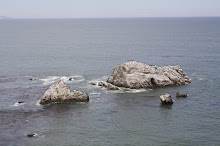
It seems like just a blink of an eye ago the battle cry heard round the world was
"Drill, baby, drill."After Presidential candidate John McCain and Vice-Presidential candidate Sarah Palin used that phrase as a slogan, chant and mantra in the 2008 U.S. electoral campaign, I certainly found myself encountering it over and over again,
ad nauseam. Even while doing my best to ignore some offensive online commenters repulsively discussing drilling in a sexual manner with relation to Ms. Palin, the words gave me unease.
I was not comfortable with the concept of drilling for oil where it might harm environmentally sensitive areas. As a Santa Barbara County, California, resident, I had heard much about the disastrous oil spill
which took place off of the coast Santa Barbara in 1969.
I love to swim. And so I always found it very upsetting to have to plan on cleaning my feet with turpentine and my hair with cold cream in order to get oil "tar" off of me after a dip in the ocean. I was told the presence of this tar was due to natural oil seepage, nothing to do with the 1969 spill--and that could be true, for all I know. But it was a constant reminder that oil can be very, very messy, difficult to clean up, and not very compatible with the biology of Earth's life forms.
So I was personally dismayed every time a new oil platform appeared off of the Santa Barbara coast. For years they had been kept to a minimum, but then it seemed that they reached some sort of jumping-off point--was it in the '80s? when they began to multiply more rapidly, like some sort of fecund sea monsters. Sometime in which memories of oil spill damage began to fade in the national consciousness, local protests began to be ignored, as the nation's voracious appetite for oil continued to average out to a rapidly upward course--and the beast had to somehow be fed.
I've been waiting since
President Jimmy Carter spoke to the nation, in the summer of 1979, regarding the U.S.'s problem with dependence on foreign oil, to see some truly powerful political momentum going towards getting this nation to create some significant alternatives to oil. But Carter's warning was mocked, and dubbed "the malaise speech." Presidential candidate Ronald Reagan benefited by characterizing himself as a more positive, upbeat choice.
At the time, as is seen in Carter's speech, one of the biggest concerns for those who were actually worried about U.S. oil dependence were the (correct) predictions that we would end up getting more than half of our oil from countries in unstable parts of the world. Places where anti-Americanism became rampant. And that this could become a threat to national security.
But many of us hoped, as the years went on and more was learned about what some of the unanticipated consequences of an oil-based economy might be, that there would also eventually be serious attention given to ALL of the looming oil-based disasters. These would include the national security problem, but also the potential dangers of
spillage, of the possibility that the theory of
peak oil is correct, and of the currently debated
climate crisis.
The oil platforms off of the coast of the Santa Barbara area can look beautiful when lit up in the dark, as in the photo above. But I think these lights are more like the lures of duplicitous sirens of the sea, than lamps leading the way to President Reagan's oft-quoted
"shining city."
As for spilling, baby...
we've had a lot more spillin' goin' on since Santa Barbara, CA, 1969. Although there have been
many larger oil spills around the world, we in the U.S. probably heard the most about the
Exxon Valdez oil spill in 1989. Ironically, this took place off of the coast of Alaska, the home state of "drill baby" Sarah Palin.
Now we are watching what happens as a massive oil spill in the Gulf of Mexico breaks against coastlines in the south. There are news updates every day, so at least some of the links below could be soon outdated. But no matter what the outcome, this spill has been big news and has sparked discussion about the safety of drilling for oil off of coastlines as well as in deep water.
However, since we haven't exactly been working feverishly on safe alternatives to oil since the days of the prescient Jimmy Carter (unfortunately), it would be quite a challenge to quickly find a replacement for oil. We could certainly do a lot better than we are doing now on conservation, but that would be only a stopgap (no pun intended...) What we have to remember is that we
put ourselves into this quagmire and so it truly is up to us to find a solution that works, not only for us, but for the habitat we need for our long-term survival. A habitat which we share with Earth's other residents, and on whom our lives also depend.


